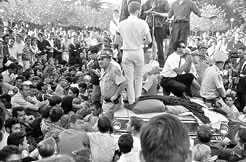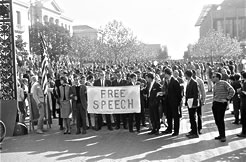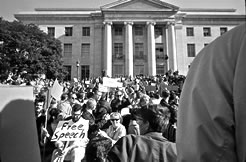|
Frequently Asked Questions:
Getting Started |
Technical |
Interface |
Related Links
GETTING STARTED:
I completed the online registration.
Why haven’t I received my password?
An email containing your password from
register@demonstrate.berkeley.edu should arrive in your mailbox within
five minutes of registration. The email may get filtered by your
email program’s spam guard—so if you don’t see it, please check
your Junk Mail folder.
I have my password, why can't I login?
Be sure to use your email address, not your screen name, to log in.
I signed in but don’t see any live video, only a big white or grey box. What’s wrong?
The live video requires a Java-enabled browser (such as Safari, Firefox, or Internet Explorer) and Java 2 version 1.4.2 or above (go to www.java.com to download). Also, when the system asks if you trust content from the Alpha Lab, click YES to download our video viewer.
How can I change my Password?
Easy: after signing in, click the “Account” button in the menu that appears on the bottom of each page. Fill in your old password and the new password desired and submit. You will now be required to sign back in with your new password.
TECHNICAL QUESTIONS:
Why do I have to keep signing back in to use the site?
Demonstrate automatically signs out inactive users after 30 seconds. To stay signed-in, keep using the camera, or go to the Photo page to view photos and contribute commentary.
What kind of video camera is this?
Demonstrate uses Panasonic’s new pan tilt zoom robotic video camera.
When two or more users are viewing, how does the system decide where to move the camera?
The Frame Selection Problem can be formulated as an optimization problem where n users share control of a single robotic pan, tilt, zoom camera. Dez Song, Ken Goldberg, and co-authors proposed the Intersection over Maximum (IOM) metric for the degree of satisfaction for each user, which improves over the standard Intersection Over Union (IOU) similarity metric. We have developed several algorithms to compute the optimal camera frame, with run times O(n2m) for a set of m zoom levels, and O((n + 1/Ε3) log2n) for an infinite set of zoom levels. The algorithms can be distributed to run in O(n m) time at each client and in O(n log n) time at the server. More information can be found at http://www.ieor.berkeley.edu/~goldberg/pubs/
INTERFACE QUESTIONS:
Has the zoom level of the camera been reduced?
Yes. The camera is capable of 22x optical zoom.
We reduced the maximum zoom level to 10x, closer to that of standard
webcams such as the webcam that was on Sproul Plaza since 1999, so
that individuals cannot be clearly distinguished. To convey the
capabilities of current webcam
technology, we will increase the zoom to its maximum level
only during the hours of 12-2pm the week of Oct 4, when we will
have a table set up on Sproul Plaza to demonstrate the project
and answer questions.
I just took a photo, why can't I see it in the Photo
Database?
Under California Law, it is illegal to take photos of
individuals in a
manner that reveals parts of their bodies that they normally would not
choose to reveal (looking up someone's skirt etc.). As a result,
we are screening photos before posting them, which
may introduce a delay of 2-24 hours before photos are posted.
Why can I no longer move the camera to see what's happening off campus
(eg. at the intersection of Telegraph Ave and Bancroft St)?
We want to avoid the possibility of taking
photos that look into cars or private residences.
What is “Current Key”?
Each week, demonstrate features a key phrase to inspire photos and commentary. The “current key” is displayed at the top of the Camera page. The keys are derived from archives of the Free Speech Movement. Your photos and commentary re-invigorate these key phrases and contribute to the Free Speech Movement’s powerful legacy of democratic engagement and open discussion of ideas.
What is the Free Speech Movement?
The Free Speech Movement was a radical student movement that arose on the campus of the University of California, Berkeley in September and October of 1964. It changed the political atmosphere at colleges and universities across the country and provided generations to come with a model for student activism. The movement launched in response to university regulations that barred students from setting up tables and passing out political literature on campus property. There were sit-ins, mass arrests, and a push by students for broader rights to advocate for political causes. Today, Sproul Hall and the surrounding Sproul Plaza are active locations for protests, marches, and other controversies involving free speech. For more information, see The Free Speech Movement Archives.
 |  |  |
Steven Marcus, 1964.
The Bancroft Library | Stephen Marcus, 1964
The Bancroft Library | Helen Nestor, 1964
Oakland Museum of California |
What is the “Influence” number (50 or higher) listed beside each active user?
Your influence value is based on how many people have commented on your photos, and how many people have commented after your commentary on other people’s photos. Your influence value determines how much control of the camera you have when others are signed in. It is displayed next to your name on the Camera page. The higher your influence, the more control you have over the camera. In other words, you increase your influence by contributing to the site dialogue—through both the commentary you make yourself and the commentary you inspire in others. (More precisely: Influence = Number of people who commented on your photos + .25 x Number of people who have
commented after you on others photos + 50).
How do I announce a future event on Sproul Plaza so that others can be aware of it?
The Live Events Schedule on the Info page lists the live events scheduled to take place on Sproul Plaza and allows you to add your own live event.
Someone took a photo or posted a comment that offends me, what can I do about it?
We reserve the right to remove images or commentary that provoke
complaints from members. (Users who have such complaints, please
specify precisely what you find offensive (specific image number and
comment number), and reasons to Prof. Ken Goldberg: goldberg
<at> ieor.berkeley.edu with Subject: DEMONSTRATE
Content Complaint)
RELATED LINKS
Free Speech Movement Archives
Earthcam's Webcam directory
Camera Central Webcam directory
What's Wrong With Public Video Surveillance? (from the ACLU Archive)
Video Surveillance (from the Electronic Privacy Information Center)
A Dangerous World: Transparency, Security and Privacy (David Brin's website)
Steve Mann on "Sousveillance"
The Ambiguous Panopticon: Foucault and the Codes of Cyberspace, by
Mark Winokur
ACLU on the PATRIOT Act
Public Access to Robotic Camera Fosters Discourse
(Angela Chen, Daily Californian, October 6, 2004)
Public Access to Robotic Camera Fosters Discourse
(Angela Chen, Daily Californian, October 6, 2004)
Whitney Museum's Artport (September 2004)
|


